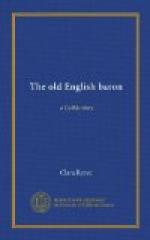“Yes indeed, Sir,” answered the servant; “the young gentlemen, my Lord’s sons, are hopeful youths; but yet there is one who is thought to exceed them all, though he is the son of a poor labourer.”
“And who is he?” said the knight.
“One Edmund Twyford, the son of a cottager in our village; he is to be sure as fine a youth as ever the sun shone upon, and of so sweet a disposition that nobody envies his good fortune.”
“What good fortune does he enjoy?”
“Why, Sir, about two years ago, my lord, at his sons request, took him into his own family, and gives him the same education as his own children; the young lords doat upon him, especially Master William, who is about his own age: It is supposed that he will attend the young Lords when they go to the wars, which my Lord intends they shall by and by.”
“What you tell me,” said Sir Philip, “increases every minute my respect for your Lord; he is an excellent father and master, he seeks out merit in obscurity; he distinguishes and rewards it, — I honour him with all my heart.”
In this manner they conversed together till they came within view of the castle. In a field near the house they saw a company of youths, with crossbows in their hands, shooting at a mark.
“There,” said the servant, “are our young gentlemen at their exercises.”
Sir Philip stopped his horse to observe them; he heard two or three of them cry out, “Edmund is the victor! He wins the prize!”
“I must,” said Sir Philip, “take a view of this Edmund.”
He jumped off his horse, gave the bridle to the servant, and walked into the field. The young gentlemen came up, and paid their respects to him; he apologized for intruding upon their sports, and asked which was the victor? Upon which the youth he spoke to beckoned to another, who immediately advanced, and made his obeisance; As he drew near, Sir Philip fixed his eyes upon him, with so much attention, that he seemed not to observe his courtesy and address. At length he recollected himself, and said, “What is your name, young man?”
“Edmund Twyford,” replied the youth; “and I have the honour to attend upon the Lord Fitz-Owen’s sons.”
“Pray, noble sir,” said the youth who first addressed Sir Philip, “are not you the stranger who is expected by my father?”
“I am, sir,” answered he, “and I go to pay my respects to him.”
“Will you excuse our attendance, Sir? We have not yet finished our exercises.”
“My dear youth,” said Sir Philip, “no apology is necessary; but will you favour me with your proper name, that I may know to whose courtesy I am obliged?”
“My name is William Fitz-Owen; that gentleman is my eldest brother, Master Robert; that other my kinsman, Master Richard Wenlock.”
“Very well; I thank you, gentle Sir; I beg you not to stir another step, your servant holds my horse.”
“Farewell, Sir,” said Master William; “I hope we shall have the pleasure of meeting you at dinner.”




